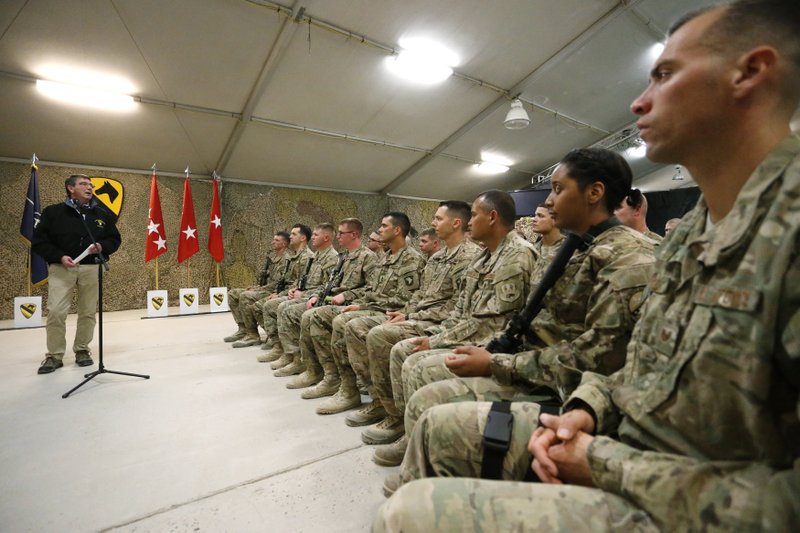KANDAHAR, Afghanistan -- U.S. Defense Secretary Ashton Carter on Sunday called Afghanistan's army "a powerful force in their own right" but declined to say whether he thinks the U.S. can scale back military training and advising this year as planned.
Carter wrapped up two days in the war zone by consulting with U.S. and Afghan commanders at Kandahar air field, an important hub in the network of U.S. advisory posts that are due to close before year's end.
In a question-and-answer session with reporters at the base in southern Afghanistan, Carter declined to say whether his visit had convinced him that the Kandahar operation should stay open longer.
The advisory work there will wind up this summer unless President Barack Obama alters his plan for ending the U.S. military presence.
"I'm not prepared to share conclusions except with him, when I reach them," Carter said. He said he was impressed by progress in professionalizing the Afghan army and police.
"The Afghan security forces have become a powerful force in their own right and good partners in their own way," he said.
Carter, who started as Pentagon chief last week, is preparing recommendations to Obama about the future of the American military presence in Afghanistan. On Saturday, Carter met with Afghan President Ashraf Ghani and said afterward that Obama is considering whether to slow the pace of U.S. troop withdrawals this year and next.
The U.S. now has about 10,000 troops in Afghanistan, including about 2,000 training and advising in Kandahar.
Today, Carter was convening a meeting in Kuwait of U.S. military commanders, intelligence officials and diplomats for what his aides billed as a freewheeling discussion of the strengths and weaknesses of the Obama administration's strategy for countering the Islamic State extremist group in Iraq and Syria.
Carter intends to examine the intellectual underpinnings of the strategy against the Islamic State, including the bombing campaigns and their connection to broader political and regional goals, a senior defense official said.
The official spoke on condition of anonymity to discuss Carter's internal planning.
Rear Adm. John Kirby, the Pentagon press secretary, said that among those expected to attend the conference are U.S. ambassadors from Jordan and elsewhere in the Mideast; the top U.S. commanders from Europe, Africa and the Mideast; and special operations force leaders.
Defense officials said Carter called the gathering immediately upon taking the post last week so he could more fully familiarize himself with the strategic underpinnings of the U.S.-led international campaign against the Islamic State. They said Carter was not necessarily seeking to change the fundamentals of the strategy, but they made clear that he would ask hard questions and press commanders and diplomats to justify their current approach.
Carter is scheduled to return to Washington on Tuesday.
U.S. commanders are known to prefer to keep the Kandahar operation open at least through the peak fighting season this summer. Current plans call for it to wind down before summer's end in order to have the entire U.S. presence at Kandahar out by December.
Earlier, Carter addressed a gathering of about 100 U.S. soldiers at Kandahar and thanked them for their work with the Afghan army. He said their advisory effort "is now becoming the heart of" the U.S. military mission in Afghanistan, which also includes hunting down remnants of al-Qaida.
Carter made clear that whatever course of action he recommends to Obama, it will be based on the goal of preserving the security gains that have been achieved during 13 years of costly combat.
"When our presence here is reduced to something much smaller than today, we want to make sure that the Afghans themselves are able to preserve the environment which our forces have created over the last few years -- one of relative security and stability," he said. "They can't do that without you."
Carter was asked for his view of criticism by U.S. Sen. John McCain, chairman of the Senate Armed Services Committee, and others about a Pentagon briefing in which a U.S. Central Command official discussed planning for an Iraqi counteroffensive to regain control of the northern city of Mosul from Islamic State militants.
McCain, R-Ariz., demanded that the administration explain why the official disclosed that the counteroffensive is scheduled to begin in April or May, and offered details such as the approximate makeup of the Iraqi forces.
Carter said the key point was that the operation in Mosul should not begin until the Iraqi forces are prepared to succeed, with the U.S. military playing an unspecified support role.
He said "no one knows the date" the operation will start because the Iraqis are still making preparations. "That isn't the kind of thing you would reveal anyway in advance," he said.
Information for the article was contributed by Robert Burns of The Associated Press and by Craig Whitlock of The Washington Post.
A Section on 02/23/2015

